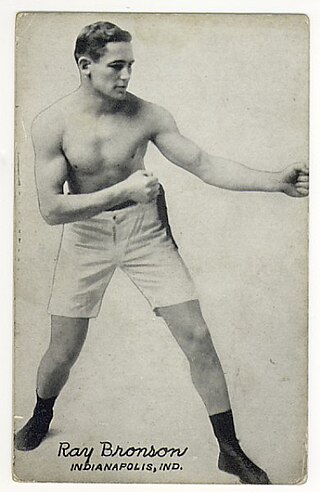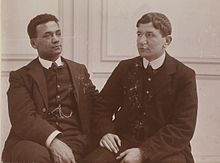Career
Jeptha became a professional boxer in South Africa before the age of 18 years, fighting as a professional in the Vaudeville Theatre and also in Fillis' Circus. [4] He started his boxing career in England as a booth fighter [5] and was reportedly a big attraction for Peddlar McMahon who operated a booth-fighting business. [6]
He had 74 fights in his career, winning 32 (KO 21), losing 27 (KO11) and drawing 6. [7] He was a popular and well known boxer. Stories about him often appeared in newspapers and he was known as "le Negre" in France and as "the Boer" in Ireland. [2] His first recorded fight in England, which he lost, was against Jim Green in Liverpool in September 1902. [7]
He won his British boxing title in a fight hall called Wonderland at 100 Whitechapel Road, Mile End, London [8] on 25 March 1907, when he knocked out Curly Watson in the fourth round. The fight was arranged for a purse of five hundred and fifty pounds. At the time, Watson (who was also known as Robert Watson, Curley Watson and Seaman Watson) was the boxing champion of the Royal Navy. Curly Watson later died of injuries sustained in a fight with Frank Inglis in London on 5 March 1910. [9] Jeptha had been having problems with damage to his eyesight since before the March 1907 title fight and had received treatment at the Moorfields Eye Hospital, and now had blurred vision. [10]
Jeptha did not hold onto the title for long. He was defeated by Joe White [2] in the British welterweight title fight at Cardiff in August 1907. He was at the peak of his career at this point, but knew that he needed to retire because of the problems with his eyesight. However, he kept on fighting and was able to make a living outside of boxing for a while when he appeared in a play called "Black against White". An actress called Mabel Goldswain appeared with him in this vaudeville play, along with British lightweight champion Jack Goldswain. Jeptha played the role of a villain and it is said that his eyes suffered further damage from heavy blows to the head from Goldswain in every performance. [10]
Later life
Jeptha fought Jim Doran [11] in October 1909 and the sight in his right eye was permanently damaged during this contest. However, he continued to box until he was injured in a fight with Joe White in July 1910. Apparently, the famous referee John Douglas and his son Johnny Douglas, together with other prominent sportsman, tried to help him earn a living. Andrew Jeptha was in hospital in Liverpool for a while, but unfortunately nothing could be done to save his sight. His supporters bought him a tobacconist and confectionery shop in Walthamstow, but he was unable to make a go of it because of his lack of sight. [10]
He returned to South Africa without his wife and children. It is recorded that he could be seen sitting on the sidewalk between the flower sellers in Adderley Street, Cape Town, selling a booklet at the price of one shilling. The title of this booklet was "A South African Boxer in Britain – Experiences of Andrew Jephta". There is a copy of this book in the South African Museum in Cape Town. [12] 05
Andrew Jeptha died in South Africa in 1931.

Henry Jackson Jr. was an American professional boxer and a world boxing champion who fought under the name Henry Armstrong.

Christopher Livingstone Eubank is a British former professional boxer who competed from 1985 to 1998. He held the World Boxing Organization (WBO) middleweight and super-middleweight titles between 1990 and 1995, and is ranked by BoxRec as the third best British super-middleweight boxer of all time.

Michael Watson is a British former professional boxer who competed from 1984 to 1991. He held the Commonwealth middleweight title from 1989 to 1991, and challenged three times for a world title between 1990 and 1991. Watson's career was cut short as a result of a near-fatal injury sustained during a loss to Chris Eubank for the WBO super-middleweight title in 1991.

James Driscoll, commonly known as Peerless Jim, was a Welsh boxer who learned his trade in the boxing ring and used it to fight his way out of poverty. Driscoll was British featherweight champion and won the coveted Lonsdale belt in 1910. He is a member of the Welsh Sports Hall of Fame, the Ring Magazine Hall of Fame, and the International Boxing Hall of Fame.

William Thomas Wells, better known as Bombardier Billy Wells, was an English heavyweight boxer. Fighting under the name "Bombardier Billy Wells", he was British and British Empire Champion from 1911 until 1919, defending his title fourteen times. In 1911 he became the first Heavyweight to win the Lonsdale Belt, which had been introduced for British champions at all weights in 1909. Phil Grant held his Lonsdale belt when he was in the TA.

The Lord Lonsdale Challenge Belt, commonly known as the Lonsdale Belt, is the oldest championship belt in British professional boxing. The 5th Earl of Lonsdale introduced the prize on behalf of the National Sporting Club (NSC), intending it to be awarded to British boxing champions. Arthur Frederick Bettinson, manager of the NSC, introduced terms and conditions regarding the holding of the belt, which ensured its lasting prestige. Freddie Welsh earned the first Lonsdale Belt in 1909 after winning the NSC British Lightweight title. Heavyweight Henry Cooper was the first and only boxer to win three Lonsdale Belts. In 1929 the British Boxing Board of Control (BBBofC) assumed responsibility for awarding the belt, which continues to be bestowed on British champions.
Laatekwei Hammond is a professional welterweight boxer. Hammond was a three-weight national champion of Ghana, winning the lightweight, light welterweight, and welterweight titles as well as the World Boxing Association and World Boxing Organisation's African titles.

David "Bomber" Pearce was a Welsh heavyweight boxing champion.
Joe White was a Welsh boxer. He won the British welterweight title at Cardiff in August 1907 when he defeated Andrew Jeptha.
Carl Johanneson is a British former professional boxer. He held the British super featherweight title from 2006 to 2008. His nickname, "Ingemar" is a nod to the famous Swedish boxer Ingemar Johansson and is the nephew of former Leeds United player Albert Johanneson. He served for four years in the Duke of Wellington's Regiment of the British Army.

Sid Smith was an English professional boxer who competed from 1907 to 1919. He was the first officially recognised BBBofC British flyweight champion, holding the title from 1912 to 1913, and was also recognized by the International Boxing Union as the world flyweight champion in 1913.

Clinton McKenzie is a former British professional boxer. He fought in the light welterweight division and became the British light welterweight title holder and briefly held the European title.

Pedlar Palmer, born Thomas Palmer, was an English boxer who held the world bantamweight championship from 1895 to 1899.
Nkosinathi Joyi, is a South African professional boxer with a southpaw stance who goes by the nickname of "Mabere". Joyi is the former IBF Minimumweight world champion, he was ranked by BoxRec and The Ring Magazine as the number one boxer in the Minimumweight division. He is also the two-time and current IBO Minimumweight champion.
Nipper Pat Daly, real name Patrick Clifford Daley, was a British boxer who fought professionally between 1923 and 1931. He made his professional debut at the age of nine or 10, achieved widespread fame in his mid teens as British boxing's 'Wonderboy', then retired from pro boxing at age 17.

Phineas Gladney John (1910–1985) was a Welsh professional boxer who fought from 1927 and 1940. John ended his career as a featherweight, but in his early professional bouts, he fought as a flyweight before increasing to bantamweight. Soon after he turned professional John competed for area titles, taking the Welsh flyweight belt in 1928 and then the Welsh bantamweight in 1929. After 1929 John failed to pursue any further titles, but continued fighting across the United Kingdom, ending his career with at least 242 professional fights.

Lawrence Samuel "Larry" Gains was a Black Canadian heavyweight boxer who was champion of Canada and the British Empire. One of the top heavyweights of his era, he was denied the opportunity to become World Champion due to the bar on black boxers competing for the title.
Jack Goldswain was a British boxer who won the English & Imperial ten stone title in 1906 and fought for the British welterweight title in 1910.

Ray Bronson briefly claimed the World Welterweight Boxing Title between February and December 1912.
Larry Ekundayo is a Nigerian professional boxer. He held the African welterweight title from 2015 to 2016 and the IBF European welterweight title from 2018 to 2019.













